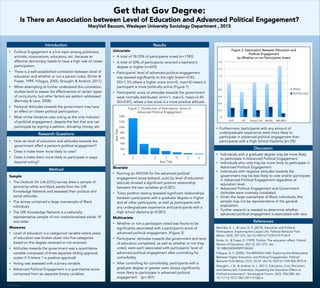More Related Content
Similar to QAC Poster (20)
QAC Poster
- 1. TEMPLATE DESIGN © 2008
www.PosterPresentations.com
Get that Gov Degree:
Is There an Association between Level of Education and Advanced Political Engagement?
MaryVail Baucom, Wesleyan University Sociology Department , 2015
Introduction
• Political Engagement is a hot topic among politicians,
activists, corporations, educators, etc. because an
effective democracy needs to have a high rate of citizen
participation.
• There is a well-established correlation between level of
education and whether or not a person votes. (Emler &
Frazer, 1999; Hillygus, 2005; Straughn & Andriot, 2011).
• When attempting to further understand this correlation,
studies tend to assess the effectiveness of certain types
of curriculums, but other factors are seldom addressed
(Berinsky & Lenz, 2008).
• Personal Attitudes towards the government may have
an effect on citizen political participation.
• Most of the literature uses voting as the only indicator
of political engagement, despite the fact that one can
participate by signing a petition, donating money, etc.
Results
Discussion
Research Questions
• How do level of education and attitudes towards the
government affect a person’s political engagement?
• Does it make them more likely to vote?
• Does it make them more likely to participate in ways
beyond voting?
Method
Sample
• The Outlook On Life (OOL) survey drew a sample of
(primarily) white and black adults from the GfK
Knowledge Network and assessed their political and
social attitudes.
• The survey contained a large oversample of Black
ndividuals
• The GfK Knowledge Network is a nationally
representative sample of non-institutionalized adults 18
and older.
Measures
• Level of education is a categorical variable where years
of education was broken down into five categories
based on the degree received or not received.
• Attitudes towards the government was a quantitative
variable composed of three separate sliding approval
scales (1-5 where 1 is positive approval)
• Voting was assessed with a binary variable.
• Advanced Political Engagement is a quantitative score
composed from six separate binary variables.
Univariate
• A total of 78.03% of participants voted (n=1783)
• A total of 30% of participants received a bachelor’s
degree or higher (n=693)
• Participants’ level of advanced political engagement
was skewed significantly to the right (mean=0.83,
SD=1.31) where a higher score (min=0, max=6) means a
participant is more politically active (Figure 1)
• Participants’ score of attitudes towards the government
were normally distributed. (min=1, max=5, mean=3.49,
SD=0.81), where a low score is a more positive attitude.
References
Berinsky, A. J., & Lenz, G. S. (2010). Education and Political
Participation: Exploring the Causal Link. Political Behavior Polit
Behav, 33(3), 357-373. doi:10.1007/s11109-010-9134-9
Emler, N., & Frazer, E. (1999). Politics: The education effect. Oxford
Review of Education, 25(1-2), 251-273. doi:
10.1080/030549899104242
Hillygus, D. S. (2005). The MISSING LINK: Exploring the Relationship
Between Higher Education and Political Engagement. Political
Behavior Polit Behav, 27(1), 25-47. doi:10.1007/s11109-005-3075-8
Straughn, J. B., & Andriot, A. L. (2011). Education, Civic Patriotism,
and Democratic Citizenship: Unpacking the Education Effect on
Political Involvement1. Sociological Forum, 26(3), 556-580. doi:
10.1111/j.1573-7861.2011.01262.x
• Furthermore, participants with any amount of
undergraduate experience were more likely to
participate in advanced political engagement than
participants with a High School Diploma (p<.05)
Bivariate
• Running an ANOVA for the advanced political
engagement score (advpoli_sum) by level of education
(educat) showed a significant positive relationship
between the two variables (p<0.001).
• Tukey posthoc testing revealed significant relationships
between participants with a graduate degree or higher
and all other participants, as well as participants with
any undergraduate experience and participants with a
high school diploma (p<0.001).
Multivariate
• Whether or not a participant voted was found to be
significantly associated with a participant’s score of
advanced political engagement. (Figure 2)
• Participants’ attitudes towards the government and level
of education completed, as well as whether or not they
voted, were each associated with participants’ level of
advanced political engagement after controlling for
comorbidity.
• After controlling for comorbidity, participants with a
graduate degree or greater were always significantly
more likely to participate in advanced political
engagement (p<.001)
• Individuals with a graduate degree may be more likely
to participate in Advanced Political Engagement.
• Individuals who vote may be more likely to participate in
Advanced Political Engagement.
• Individuals with negative attitudes towards the
government may be less likely to vote and/or participate
in Advanced Political Engagement regardless of
education level.
• Advanced Political Engagement and Government
Attitudes were inversely correlated.
• Given the large oversample of Black individuals, the
sample may not be representative of the general
population.
• Further research is needed to determine whether
advanced political engagement is associated with race.
